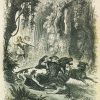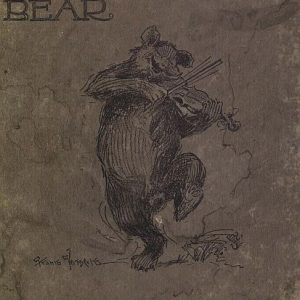calsfoundation@cals.org
Arkansaw Bear: A Tale of Fanciful Adventure
The Arkansaw Bear: A Tale of Fanciful Adventure is a children’s story written by Albert Bigelow Paine in 1898. Paine called upon southern folktale and storytelling tradition and used lyrics of “The Arkansas Traveler” as inspiration for his story.
Albert Paine (July 10, 1861–April 9, 1937) was a highly respected American author and noted biographer of Mark Twain. Besides fiction, Paine wrote humor and poetry, and he served as a member of the Pulitzer Prize committee. Paine spent the majority of his adult life living and writing in Europe, where he was awarded the title of Chevalier in the Legion d’Honneur by the French government for his biographies of Joan of Arc.
Paine told the story in The Arkansaw Bear: A Tale of Fanciful Adventure using both song and verse. Sandford C. Faulkner wrote the musical score for “The Arkansas Traveler” in the 1800s, but many different sets of lyrics have been written since that time. The lyrics that inspired Paine’s writing were:
“Oh, there was a little boy and his name was Bo,
Went out into the wood when the moon was low,
And he met an old bear who was hungry for a snack,
And his folks are still a-waiting for Bosephus to come back.
“For the boy became the teacher of this kind and gentle creature
Who can play upon the fiddle in a very skillful way.
And they’ll never, ever sever, and they’ll travel on forever,
Bosephus and the fiddle and the old black bear.”
Paine’s book tells the tale of how Bosephus (shortened as “Bo”), a recent runaway, meets Horatio, a talking, fiddle-playing bear in a patch of Arkansas woods. Bo recognizes the tune that Horatio is fiddling as “The Arkansas Traveler,” and, having a fine voice, Bo sings the lyrics. Bo and Horatio form a friendship and agree to travel around the South, singing both original and made-up lyrics to the tune, to earn a living. After a series of misadventures whereby the two of them travel to Louisiana and Bo repeatedly gets Horatio out of trouble, the two are arrested when Horatio steals a coat and hat belonging to a village constable. Bo and Horatio plead their case by singing a song, and the justice is moved to release both of them. Bo and Horatio decide to return to Arkansas, where they “feel a good deal safer.” Horatio opens a colony for bears, and Bo decides to return to Louisiana to attend school. The friends say their goodbyes, but as Bo is walking down the road alone, Horatio races to catch him. The pair reunites, and the two once again pledge their friendship. The story ends with Horatio playing “The Arkansas Traveler” on his fiddle and Bo making up new lyrics as they begin their journey back to Louisiana.
Regional interest in the story inspired Paine to write a sequel, The Arkansaw Bear and Elsie, published by H. Altemus Company in 1909. In 2003, William Glennon wrote a stage play, The Trial of the Arkansas Bear, inspired by Paine’s story.
For additional information:
Glennon, William. The Trial of the Arkansas Bear. Woodstock, IL: Dramatic Publishing Company, 2003.
Paine, Albert Bigelow. The Arkansaw Bear: A Tale of Fanciful Adventure. New York: R. H. Russell, 1898. Online at http://www.gutenberg.org/ebooks/28302 (accessed January 30, 2024).
Larry LeMasters
LeMasters’ Antique News Service
 Big Bear of Arkansas, The
Big Bear of Arkansas, The Black Bears
Black Bears Post-Reconstruction through the Gilded Age, 1875 through 1900
Post-Reconstruction through the Gilded Age, 1875 through 1900 Arkansaw Bear: A Tale of Fanciful Adventure
Arkansaw Bear: A Tale of Fanciful Adventure 



Comments
No comments on this entry yet.